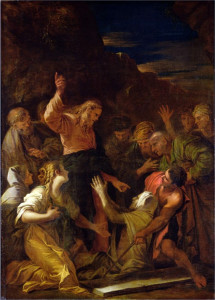 Why does John call Jesus “the Word?”
Why does John call Jesus “the Word?”
John introduces his gospel of Jesus by calling him “The Word” (John 1:1). Why does he do this? And what does it mean for us at Christmastime?
There are only two other places in the Bible (of which I am aware) that Jesus is called “The Word.” One is in John 1:14, the other Revelation 19:13.
“And the Word became flesh and dwelt among us, and we have seen his glory, glory as of the only Son from the Father, full of grace and truth” (John 1:14).
“He (the glorious white horse rider) is clothed in a robe dipped in blood, and the name by which he is called is The Word of God” (Revelation 19:13).
Why did John write that “the Word” became flesh and not “the Way” or “the Truth” or “the Life” or any other ephemeral idea associated with Jesus? Why is Jesus revealed in the end as a triumphant bloodied victor named “The Word of God” and not “the Faithfulness of God” or “the Truth of God?”
The word translated into ‘Word’ in these cases is the Greek word, ‘logos.’ To the Jews who read it, it connoted God’s Word, as in Scripture and the truths found therein—something said. To the non-Jews who read it, it connoted logic and reason—something understood. All the preachers and commentators I consulted seem to agree that both are in view here.
In the words of commentator Raymond Brown, Jesus is the Word of God in that he is the full, decisive, final and perfect communication from God to mankind. Jesus is the ultimate expression of all that God wants to say to us and all that God wants us to understand. And Christmas is the celebration of this communication’s arrival, like a glorious package in the mail or the ultimate text message.
Jesus is God’s Perfect Communication to Mankind
Hebrews 1:1-3 sheds a lot of light on this idea:
“Long ago, at many times and in many ways, God spoke to our fathers by the prophets, but in these last days he has spoken to us by his Son, whom he appointed the heir of all things, through whom also he created the world. He is the radiance of the glory of God and the exact imprint of his nature, and he upholds the universe by the word of his power.”
God has communicated with mankind “many times and in many ways” through prophets. Prophets were men whom God used as messengers. He told them what to say to people on his behalf. Many of the Old Testament books are recordings of these communications.
But now, “in these last days,” God has communicated in a different way. Rather than using men as messengers, he became the man who is the message. Jesus Christ doesn’t relay a message; he is the message.
I want to teach my three-year-old daughter and six-year-old son to love people. How can I do it? I might teach them with words and verbal examples, such as, “You must love people by sharing your toys and speaking nicely to them.” Then I could add my own living example, by loving them and others. Instruction and example are the best tools we have for communicating such things. But God communicated in an even better way: incarnation.
Yes, God has verbally instructed us about truth and love and life through the prophets and the Bible. Yes, he has exemplified all of this in his relationship with mankind throughout history. But, in Jesus he physically embodies the message as one of us. This would be like me becoming a child to embody what I want to communicate to my children as their brother.
Keep in mind that in this example I’ve talked only about how to teach an idea and behavior to my children; but what God communicates to the world in Jesus is much deeper than that. What exactly does God communicate to the world in Jesus? Hebrews 1:3a tells us at least some of it:
“He is the radiance of the glory of God and the exact imprint of his nature…”
In Jesus, God communicates to us his glory and his nature. Jesus doesn’t just radiate God’s glory; he is the radiance of God’s glory. It’s as though God’s glory is a blazing fire and Jesus is the radiating light and heat ensuing from it. Jesus doesn’t just replicate God’s nature; he is its exact imprint. This is a printing term, meaning that Jesus is God’s nature engraved into a human being.
So, in Jesus God communicates not just things he wants us to know or do. In Jesus, God communicates himself to the world. You want to know God, know Jesus. You want to hear from God, hear Jesus. You want to understand God, understand Jesus. This would be like me becoming a child, not only to teach Lillian and Elias how to love; but so that they can truly know me, how I think, how I feel, what I love, what I hate, etc.—all the while still being their father so that they can love me all the more as my children (mind blown yet?).
Implication One: God wants us to know him.
Maybe you have the impression that God is about rules and regulations, primarily wanting you to know what’s right and what’s wrong and to act accordingly. But that is not true. God is about relationship. He wants you to know him and love him and worship him. Remember the number one rule is to love the Lord your God with all your heart, soul, mind and strength (Luke 10:27).
Maybe your father was a distant figure who didn’t show affection and only communicated expectations and disappointments. Don’t project that idea of fatherhood onto the Father. Instead, know that the Father came down to fulfill the expectations and forgive the disappointments in Jesus Christ so that you could be with him for eternity as his precious child.
Implication Two: We need to know him.
We don’t primarily need to-do lists, information or gifts from God; we need God himself. For example, when you’re anxious, God doesn’t give you explanations or magical peace pills. Instead he tells you to talk to him about it, draw near to him and allow his peace to guard your heart and mind (Philippians 4:6-7).
Many of us want to relate to God in the same way we relate to Santa Claus. We want him to drop down the chimney with packages of what we need and then to dissapear until we need his stuff again. But God doesn’t primarily give us stuff. He gives us himself in Jesus Christ.
Implication Three: Jesus is the only way to know him.
Some believe that there are many ways to reach God, as though he is on top of a mountain and we’re at the base, cutting our own different, but equally valid paths to reach him. In this view, Christianity, Buddhism, Hinduism, Pantheism, etc. are all just different paths to the same destination. This notion is incompatible with the doctrine of the incarnation.
Christianity’s claim is that there is one path and it was cut, not from man toward God, but from God toward man. This one path is Jesus Christ. When John writes in John 1:14 that “the Word became flesh and dwelt among us,” he means that God’s full, decisive, final and perfect self-disclosure became human flesh and lived as one of us. God’s self-disclosure came down to us packaged in skin and muscle and tissue and fat and hair—a man that you could see, touch, hug, hear and follow.
What does all this mean for us?
You might be wondering, ‘But how does this help us? Jesus is no longer walking and talking on the earth as he did back then.’ It’s true that we are no longer able to literally see, touch, hug, hear and follow Jesus. But the incarnation of the Word does give us two important things: a witness and a promise.
We have the witness “attested to us by those who heard” (Hebrews 2:3). These are the eye-witness accounts of the Word in the flesh recorded in the New Testament. This is what John’s gospel is all about (John 20:31). So we don’t just rely on human insight about ideas and theories about God. We rely on the record of God as people actually saw and heard him.
We also have the promise that Jesus is coming back. According to Revelation 19:11-16, we will see the Word in the flesh again; and it will be a glorious and fearsome sight. Keep in mind that this is not literal reporting of an event, but an account of a vision that God revealed to John regarding Jesus’ return. We won’t know exactly what this will be like until it happens. Here’s what John saw:
Heaven opens to reveal a white horse with a man sitting on it. This man is Faithful and True, a man of righteous judgment and war. His eyes are like a flame of fire. On his head are many crowns. There is mystery about this man who has a name written that no one knows but himself. He is dressed in a blood-drenched robe. He is called The Word of God. Behind him stand the armies of heaven, arrayed in pure white garments and mounted on white horses. Jesus opens his mouth to reveal a sharp sword with which John understands that Jesus will strike down the nations, tread the fury of God’s wrath and establish his rule as King of kings and Lord of lords.
Conclusion
John called Jesus “the Word” because Jesus is the full, decisive, final and perfect self-disclosure of God to mankind. The incarnation of the Word makes clear that God wants us to know him and that Jesus is the only avenue through which to do so. Praise God that, even though Jesus is not present with us in the flesh as he was then, we have the witness of those who saw him and the promise of his return.
This Christmas, I urge you to read the eye-witness accounts and look at Jesus as the radiance of God’s glory and the exact imprint of his nature. Get to know God this Christmas, by getting to know Jesus Christ.







